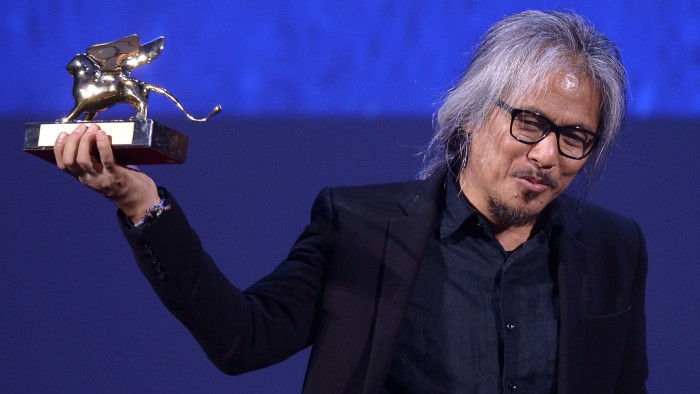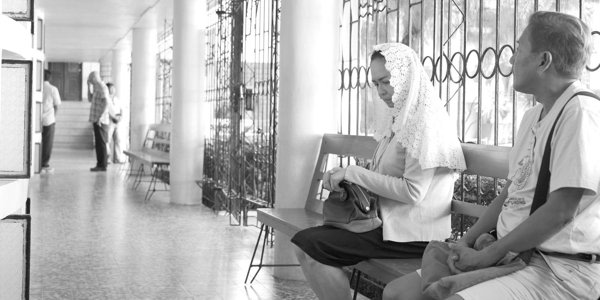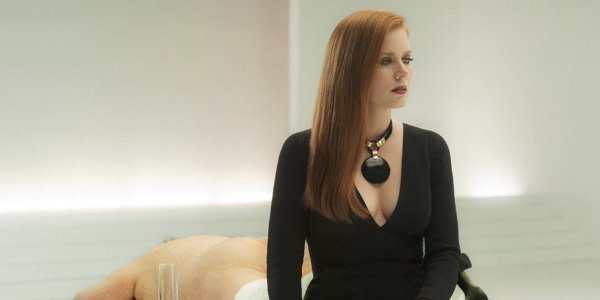Venice Film Festival: four-hour Filipino epic takes top prize

Simply sign up to the Life & Arts myFT Digest -- delivered directly to your inbox.
Never underestimate a tortoise. The Woman Who Left, a Filipino drama that clocks in at nearly four hours and unfolds at glacial pace, snuck in late on at the Venice Film Festival to deny its more sprightly rivals and scoop the top-prize Golden Lion. Another surprise winner in an event known for them.
It was almost a case of he who screens last, screens longest. Lav Diaz’s film was the 19th of 20 Competition films shown — after my second festival report and at a point when many attendees had already left the Venice Lido. The running time was daunting but critics knew we had in fact got off lightly — Diaz’s oeuvre includes several films over eight hours, the longest just shy of an eye-watering 10.
The black-and-white-shot Woman Who Left, loosely inspired by a Tolstoy short story, gets off to a gripping start. We meet Horacia, a woman in her late fifties who has spent the past 30 years locked up for murder and suddenly learns that she is to be freed. As events unfold, the film’s title comes to suggest not only her release from incarceration but the life she left behind as a young woman and must now face again — not least the two children she hasn’t seen in the intervening period.
It is her compulsion to settle old scores and mend untended scars that drives the film. As Horacia struggles to reconnect the past to the present, she moves to the city where she finds a surrogate to mother in a gay prostitute who plies his trade as a woman. It’s not the only kind of drag: Diaz likes to let his characters to marinade at length and thinks nothing of having a simple sequence last 20 minutes; some scenes featuring a garrulous seller of balot (fertilised duck eggs), for example, outstay their welcome. Diaz is not only writer and director but cinematographer and editor.

Yet the patient approach pays off in other ways. The relationship between the two lost souls grows and deepens to become truly affecting, and an unexpected duet of “Sunrise, Sunset” from Fiddler on the Roof is a remarkably rousing and affecting standout. The Woman Who Left may struggle to attract western audiences beyond festivals but it is a film that lingers in the mind and deserves to be seen: surrender yourself to its rhythms and it is digestible — certainly more so, one suspects, than a fertilised duck egg.
Elsewhere, the awards, handed out by an international jury headed by Sam Mendes, held fewer big surprises. Nocturnal Animals, for my money the best film in competition, had to make do with the runner-up Grand Jury Prize but Tom Ford’s gruelling, multi-layered marvel will surely pick up more gongs in the awards season to come.

Best Director was shared by Mexican relative newcomer Amat Escalante for his bracingly bizarre The Untamed and Russian veteran Andrei Konchalovsky for Paradise. Another late entry, this Holocaust drama takes the unusual approach of giving all sides equal weight: so we get a vivid account of a Russian countess sent to a concentration camp for hiding Jewish children but also that of her counterpart, a young German nobleman turned high-ranking SS officer. Both are conflicted in their own ways and in their feelings for each other. It is a vivid and highly charged work but compromised by a distracting interview device that periodically interrupts the main narrative and diminishes its momentum.
No complaints about the acting awards. Argentina’s Oscar Martínez richly deserved the Best Actor prize for his darkly droll portrayal of a jaded novelist in The Distinguished Citizen, though his acceptance speech could never match the caustic one his character delivers at the outset of the film. American star Emma Stone was named Best Actress for her all-singing, all-dancing turn opposite Ryan Gosling in La La Land , which will only amplify her Oscar buzz, while Best New Young Actor justly went to German actress Paula Beer for her luminous portrayal of a war widow in François Ozon’s Frantz.
Noah Oppenheim took Best Screenplay for intelligently and sensitively navigating the aftermath of the Kennedy assassination in the Natalie Portman-starring Jackie, and a Special Jury Prize nod went to the bloodthirsty The Bad Batch, Ana Lily Amirpour’s woozy follow-up to her widely admired vampiric debut A Girl Walks Home Alone at Night.
Comments